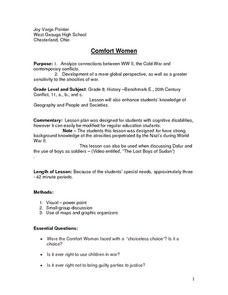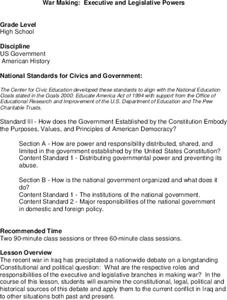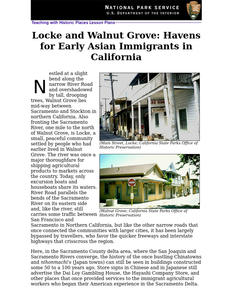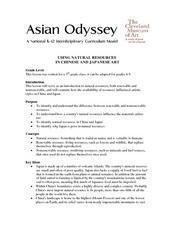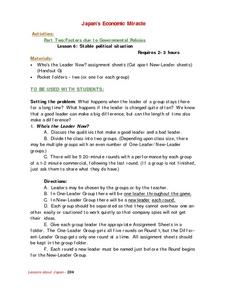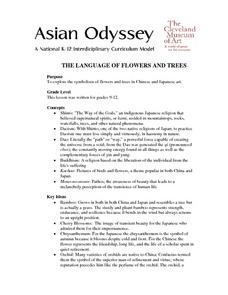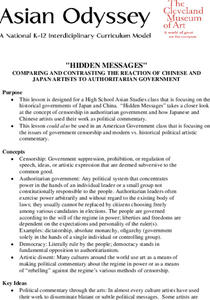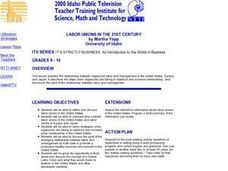Curated OER
Comfort Women
Ninth graders analyze connections between WW II, the Cold War and contemporary conflicts. They discover a more global perspective, as well as a greater sensitivity to the atrocities of war, and how the atrocities against the...
Curated OER
Ancient China
Students research different dynasties that existed in China around different themes. They chart each dynasty for written assessment. Each chart has details that chronicles the gathered information.
Curated OER
Second Star To the Left and Straight On 'Till Morning" - Spreadsheet Driven Exploration of Pacific Asian Geography
Students explore the geography of Pacific Asia. The class is divided into two groups to participate in a role-play activity where they act as European explorers. Students utilize mathematics, spreadsheet and internet technology to make...
Curated OER
War Making: Executive and Legislative Powers
Students examine Constitution and what it says about war-making power, contrast roles and responsibilities of executive and legislative branches of government when it comes to making war, become familiar with important 20th and 21st...
Curated OER
The Tet Offensive and the Vietnam War
Students comprehend how the United States became involved in what one historian called the quagmire. Students identify and analyze the importance of the Tet Offensive in turning American public opinion against the Vietnam War. Students...
Curated OER
Locke and Walnut Grove: Havens for Early Asian Immigrants in California
Students use readings, maps and photos to examine the life of Japanese-American immigrants in Locke and Walnut Grove in the early 1900s. They discuss their research findings, role-play the lives of immigrants and write responses.
Curated OER
The Concept of Wa II
Twelfth graders are introduced to the concept of wa in the Japanese culture. In groups, they compare and contrast the way disputes are handled in both countries. They are given a case in which they state the facts and the issues involved.
Curated OER
Tetsuko KUROYANAGI
Students investigate the life and influence of Tet suko Kuroyanagi upon the world. They conduct research into her life from the 1st grade to adulthood. Students read excerpts from her book for information and inspiration.
Curated OER
State Assisted Capitalism
Young scholars discuss a the places to gain financial help when starting a business. With a partner, they calculate the amount of interest and the total amount being paid back. they brainstorm a list of things the government can do to...
Curated OER
Role of "Outsiders" And Traders in Society
Students examine the Chinese and Japanese conceptions of "insiders" and "outsiders" and how this affects the attitude toward foreign traders from the 6th to the 16th centuries. Lesson extensions are included.
Curated OER
Using Natural Resources In Chinese And Japanese Art
Students discuss the uses and availability of natural resources in China and Japan and how those resources effected visual art from each country. This lesson includes two possible enrichment activities.
Curated OER
Local Mobilization for War
Tenth graders analyze how government policies led to complete concentration in war effort, evaluate how patriotism was encouraged by many local and state groups, and discuss fate of Japanese Americans.
Curated OER
Japanese Influence on Southeast Asia
Students examine the countries occupied by Japan and the influence it had on them. They conduct library research on assigned countries and draw maps of the territory Japan occupied. they give class presentations using Japanese vocabulary.
Curated OER
The Clothing of the Buddha
Students discuss the idea of cultural diffusion by examining how the sculptural portrayal of the Buddha's clothing evolved in Japanese and Chinese art. This lesson concludes with a group project and presentation.
Curated OER
Chinese And Japanese Tomb Cultures
Students examine burial customs in ancient China and Japan comparing those customs to burial traditions from other cultures. This lesson leads to group creative projects of mock "tombs".
Curated OER
Part Two: Factors Due To Governmental Policies
Middle schoolers brainstorm a list of qualities that make a good leader and a bad leader. In groups, they create and perfrom a commercial about how to act when you are a leader and following directions. They discuss the activity and how...
Curated OER
"He Says, She Says"
Stuents compare and contrast male and female views of love and beauty in classic Chinese and Japanese society through the reading and evaluation of prose and poetry. Chinese and Japanese art is also studied.
Curated OER
The Language of Flowers And Trees
High schoolers explore the symbolism of flowers and trees in Chinese and Japanese art. This lesson meets state standards and includes two possible lesson extensions or lesson enrichments.
Curated OER
The Medium And The Message
Learners compare and contrast Buddhist sculpture in varying materials through in-class discussions and small cooperative learning groups. This lesson includes possible lesson extensions.
Curated OER
Religion And Magic
Students examine the indigenous religions of China (Daoism) and Japan (Shinto) to see how magical beliefs and practices form an integral part of these religions. This lesson may be controversial.
Curated OER
Hidden Messages
Pupils examine the concept of censorship in authoritarian government and how Japanese and Chinese artists used their work as political commentary. This lesson includes possible lesson enrichments.
Curated OER
Comparing Chinese And Japanese Ceramics
Students discuss the conception of beauty by considering and contrasting the
appearance and use of Chinese and Japanese ceramics in this lesson for the middle or high school classroom.
Curated OER
LABOR UNIONS IN THE 21ST CENTURY
Students define and discuss labor unions in the United States. They compare and contrast labor unions in the United States and labor unions in Europe and Japan.
Curated OER
The Rulers of Sky And Earth
Students investigate how symbols of power, the dragon and the tiger, are portrayed in the art of China and Japan and compare and contrast this with the Western conception and portrayal of the dragon.


